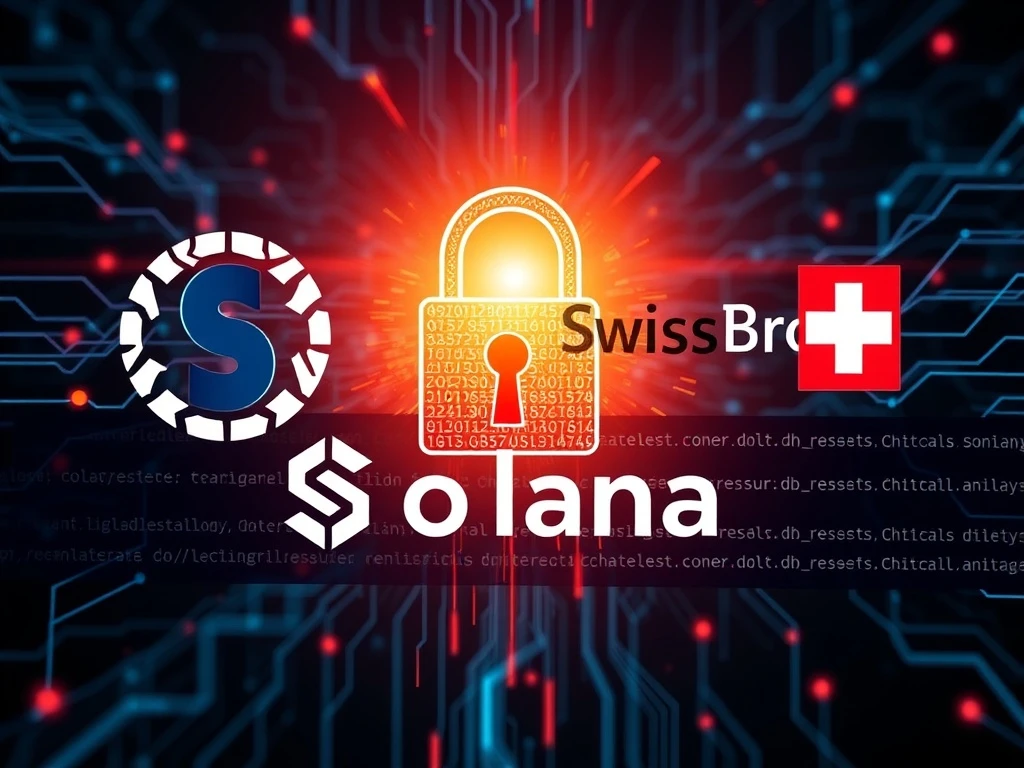Critical SwissBorg Solana Hack: $41M Lost via Third-Party API Compromise

The cryptocurrency world reels from another significant security incident. SwissBorg, a prominent Switzerland-based crypto wealth management platform, recently confirmed a **SwissBorg Solana hack**, resulting in a staggering loss of approximately $41 million in Solana (SOL) tokens. This **DeFi breach** originated from a compromise within a third-party API, specifically affecting the platform’s Solana Earn program. For many investors, this incident highlights the persistent vulnerabilities in the rapidly evolving digital asset landscape. It serves as a stark reminder of the inherent risks associated with even established platforms, particularly when relying on external infrastructure.
Unpacking the $41M Solana Hack Details
On Monday, SwissBorg announced that hackers had drained roughly 193,000 SOL tokens from its Solana Earn program. This substantial loss translates to approximately $41 million at the time of the incident. Significantly, the breach stemmed from a vulnerability within the API of Kiln, SwissBorg’s staking partner. While this represents a considerable sum, SwissBorg was quick to clarify the scope of the attack. Only its Solana Earn product was impacted; other SwissBorg apps and Earn offerings remained secure. The company immediately initiated an investigation and took steps to mitigate further risks. Furthermore, they emphasized that the core operations of the platform were unaffected.
The **Solana hack** specifically targeted users participating in the Solana Earn program. This particular program allows users to deposit SOL through the SwissBorg app to gain staking rewards. Kiln provides the underlying infrastructure for this service. The incident affected a relatively small portion of SwissBorg’s user base, impacting only about 1% of its customers and 2% of its total assets. This limited exposure, while still significant, prevented a more widespread catastrophe for the platform. However, it certainly raises questions about the security protocols of third-party integrations.
The Kiln API: A Critical Point of Vulnerability and How API Attacks Work
The breach originated with Kiln, a recognized staking infrastructure provider. Kiln powers yield products across various blockchains, including Solana and Ethereum. An **API attack** targets the software “bridge” that connects two distinct systems. In this specific case, SwissBorg’s application relied on Kiln’s API to communicate seamlessly with Solana’s staking network. By compromising this critical API, hackers gained unauthorized access. They were then able to manipulate requests and siphon off funds from the targeted Earn program.
Understanding how an API attack unfolds is crucial for appreciating the gravity of this **DeFi breach**. An API, or Application Programming Interface, acts as a messenger between different software components. When an application needs to perform a function (like staking crypto), it sends a request via an API to another service. If this API is poorly secured, attackers can exploit vulnerabilities. They might:
- Intercept Communications: Eavesdrop on data passing between systems.
- Inject Malicious Code: Send unauthorized commands to the connected service.
- Bypass Authentication: Gain access without proper credentials.
- Manipulate Data: Alter information being sent or received, as seen in this Solana hack.
Therefore, the security of these digital bridges is paramount for any platform relying on external services. The **Kiln API** became the Achilles’ heel in this unfortunate incident, underscoring the interconnected risks within the crypto ecosystem.
SwissBorg’s Immediate Response and Commitment to Users
Following the **SwissBorg hack**, CEO Cyrus Fazel hosted an X Space to address the community directly. He quickly reassured users that the company remains in robust financial health. Daily operations continue unaffected for the vast majority of its user base. Fazel stated that while the amount is substantial, it does not jeopardize SwissBorg’s overall stability. The company also confirmed that it would directly contact all affected users via email. This proactive communication strategy aims to keep users informed and alleviate concerns during a stressful period.
SwissBorg has firmly pledged to reimburse all affected users. Fazel highlighted the company’s strong treasury, indicating that they possess the necessary funds to cover the losses. This commitment to full reimbursement is a critical step in maintaining user trust and confidence after such a significant **DeFi breach**. Furthermore, SwissBorg is actively collaborating with various international agencies, law enforcement, and other exchanges. They are also engaging white-hat hackers to assist with the ongoing investigation. These efforts have already led to some transactions being blocked, showing progress in the recovery process. Fazel acknowledged the incident as “a bad day for SwissBorg” but also emphasized its role as a learning experience for the company, promising enhanced security measures going forward.
Strengthening Crypto Security: Lessons from the SwissBorg Incident
This incident provides valuable lessons for both platforms and individual users concerning **crypto security**. For platforms like SwissBorg, it highlights the critical importance of rigorous due diligence on third-party partners. Regular security audits of all integrated APIs are non-negotiable. Implementing robust access controls, continuous monitoring, and multi-layered security protocols are essential. Furthermore, clear incident response plans become vital when a breach inevitably occurs. Platforms must prioritize the integrity of their entire ecosystem, not just their internal systems.
For users, the **SwissBorg Solana hack** underscores the need for vigilance. While platforms strive for security, users also play a role in protecting their assets. Diversifying holdings across different platforms and self-custody solutions can reduce single-point-of-failure risks. Moreover, understanding the specific risks associated with various crypto products, such as staking programs that rely on third-party infrastructure, is paramount. Always enable two-factor authentication (2FA) and be wary of phishing attempts. Regularly review account activity and remain informed about security advisories from platforms you use.
Tracing the Stolen Funds and Broader Industry Implications
Blockchain data from Solscan provides a clear trail of the stolen funds. The addresses receiving the drained SOL tokens are now conspicuously labeled as the “SwissBorg Exploiter.” This labeling serves as a crucial warning for other users to exercise extreme caution. Any interaction with these identified wallets could pose further risks. The transparency of public blockchains, while a double-edged sword, aids in tracking illicit movements and assists investigators.
This **DeFi breach** also carries broader implications for the Solana ecosystem and investor confidence. While Solana itself was not directly compromised, an incident involving a major platform utilizing its network can cast a shadow. It reminds the industry that even with advanced blockchain technology, the interfaces and applications built on top of it remain vulnerable points. The reliance on third-party service providers like Kiln, while enabling scalability and specialized services, introduces additional attack vectors. Therefore, the entire crypto community must continually evolve its **crypto security** practices.
In conclusion, the **SwissBorg hack** is a significant event, but SwissBorg’s swift response and commitment to reimbursement offer a measure of reassurance. It serves as a potent reminder that in the fast-paced world of decentralized finance, security is a never-ending battle. Both platforms and users must remain diligent, adaptive, and proactive in safeguarding digital assets against sophisticated threats. This incident will undoubtedly lead to improved security standards across the industry, reinforcing the importance of robust infrastructure and transparent communication in times of crisis.










